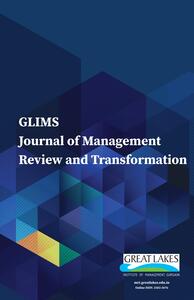
1 Thakur Global Business School, Mumbai, Maharashtra, India

Creative Commons Non Commercial CC BY-NC: This article is distributed under the terms of the Creative Commons Attribution-NonCommercial 4.0 License (http://www.creativecommons.org/licenses/by-nc/4.0/) which permits non-Commercial use, reproduction and distribution of the work without further permission provided the original work is attributed.
Sustainable development has been cited in a plethora of research time and again. Nevertheless, the emergence of interest from industries and research has significantly surged in recent years as evidenced by innumerable research insights provided every year. This era has been a testament to disruptions and uncertainties like never before. It has challenged mankind to inculcate sustainable practices in our lifestyles and make it a part of our routine. Past events, such as the pandemic, war, economic fluctuations, political instability, mindless infrastructural development and climate change, are a wakeup call for embracing our true self in unison with nature. This calls for tireless efforts and actions to revive the loss and bounce back. The fact of imbibing sustainability has to be adapted across all sectors. Today, where we are selling everything right from basics to luxury products and services, it is all the more important to bear in mind that not only manufacturers but also customers need to have sustainability parameters in what they are producing, and what we are consuming. Therefore, this study is an attempt to dive into the depths of sustainability with a focused mindset to keep doing the right things despite the hardships. Interviews of experts from across industry and society were taken in addition to an in-depth analysis of sustainability models. The research will be helpful to corporate professionals, researchers, academicians and society at large.
Sustainable development, sustainable innovation, quality of life, sustainable culture, human well-being, models of sustainability
Cillo, V., Petruzzelli, A. M., Ardito, L., & Giudice, M. D. (2019). Understanding sustainable innovation: A systematic literature review. Corporate Social Responsibility and Environmental Management, 26(5), 1012–1025.
Elliott, J. A. (2013). An introduction to sustainable development. Routledge.
Felce, D., & Perry, J. (1995). Quality of life: Its definition and measurement. Research in Developmental Disabilities, 16(1), 51–74.
Freeman, C. (1982). Competitive advantage of nations and multilateral trade system: How can Lebanon benefit from trade liberalization without enhancing its strategic industries? The economics of industrial innovation (2nd ed.). Francis Pinter.
Guimarães, J. F., Severo, E. A., Júnior, L. A., Batista Da Costa, W. P., & Salmoria, F. T. (2020). Governance and quality of life in smart cities: Towards sustainable development goals. Journal of Cleaner Production, 253, 119926.
Hamedani, A. Z. (2010). The amoeba model sustainability. ResearchGate.
Hartig, T., Mitchell, R., Vries, S., & Frumkin, H. ( 2014). Nature and health. Annual Review of Public Health, 35, 207–228.
Helliwell, J. F., Huang, H., Wang, S., & Norton, M. (2020). World happiness report 2020. Sustainable Development Solutions Network.
Herath, H. R., & Rathnayake, R. S. (2019). A critical approach towards sustainable development. International Journal of Agriculture Innovations and Research, 7(4), 446–454.
Kassouri, Y., & Alt.png) nta
nta.png) , H. (2020). Human well-being versus ecological footprint in MENA countries: A trade-off? Journal of Environmental Management, 263, 110405.
, H. (2020). Human well-being versus ecological footprint in MENA countries: A trade-off? Journal of Environmental Management, 263, 110405.
Kneipp, J. M., Gomes, C. M., Bichueti, R. S., Frizzo, K., Perlin, A. P., & Gestão, R. (2019). Sustainable innovation practices and their relationship with the performance of industrial companies. Emerald Insight, 26(2), 94–111.
Lozano, R. (2008). Envisioning sustainability three-dimensionally. Journal of Cleaner Production, 16(17), 1838–1846.
Mitlin, D. (1992). Sustainable development: A guide to literature. Environment and Urbanization, 4(1), 111–124.
Moskal, E., & López, V. N. (2019). Potential of CO2-EOR for near-term decarbonization. Frontier Climate.
Purohit, S. (2025). The role of urban green spaces in mitigating urban heat island effect amidst climate change. Research Journal of Chemistry and Environment, 29(1). https://doi.org/10.4236/ojapps.2024.1411207
Schein, E. (2012). The role of organization development in the human resource function. HarperCollins.
Thakshila Ruvini Herath, H. M., & Prabodha Subhashini Rathnayake, R. M. (2019). A critical approach towards sustainable development models: A review. International Journal of Agriculture Innovations and Research, 7(4), 446–454.
Thatcher, A. (2015). Defining human factors for sustainable development. ResearchGate.
UNESCO. (2017). Education for sustainable development goals: Learning objectives. UNESCO Digital Library.
Wali, A., Alvira, D., Tallman, P. S., Ravikumar, A., & Macedo, M. O. (2017). A new approach to conservation: Using community empowerment for sustainable well-being. Ecology and Society, 22(4). https://doi.org/10.5751/ES-09598-220406
Ward, P. M. (2015). Housing rehab for consolidated informal settlements: A new policy agenda for 2016 UN-Habitat III. UN-Habitat Conference. Habitat International, 50(2). https://doi.org/10.1016/j.habitatint.2015.08.021
Yan, W.-J., & Li, K.-R. (2023). Sustainable cultural innovation practice: Heritage education in universities and creative inheritance of intangible cultural heritage craft. Sustainability, 15(2), 1194.
Zandee, D. P., & Cooperrider, D. L. (2008). Appreciable worlds inspired inquiry. SAGE Publications.